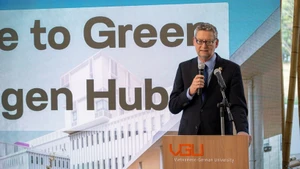Recently, the Ha Noi People’s Committee and Ha Noi Thien Y Environmental Energy Joint Stock Company inaugurated the Soc Son Waste-to-Energy Plant — the largest of its kind in Viet Nam and the second largest in the world.
The operation of this project marks a major milestone in the capital’s waste treatment efforts while also creating an important renewable energy source.
The Soc Son plant has a processing capacity of 5,000 tonnes of waste per day and night and generates 90 MW of electricity per hour. City leaders affirmed that the plant helps treat waste efficiently, reduce pollution, and supply clean electricity to tens of thousands of households in the capital, contributing to building a circular economy model in Ha Noi.
Earlier, on May 1, 2025, the Seraphin Waste-to-Energy Plant began receiving and processing waste and commenced commercial electricity generation on July 1, 2025. Seraphin is the first large-scale waste-to-energy plant invested in and operated by a Vietnamese enterprise and is currently the second largest in Southeast Asia. With a daily processing capacity of 2,250 tonnes of waste, the plant produces around 37 MW of clean electricity per hour.
According to the Ha Noi Department of Industry and Trade, by the end of 2025, the city’s renewable energy capacity — through the operation of the Soc Son and Seraphin plants — will reach approximately 129.3 MW from waste-to-energy projects.
Alongside the construction of waste-to-energy plants, Ha Noi has also focused on developing rooftop solar power systems.
According to the Department of Industry and Trade, by the end of 2024, the total installed rooftop solar capacity in the city reached 102.928 MWp — including 33.569 MWp from systems developed before January 1, 2021 that have signed solar power purchase agreements.
Between 2021 and 2025, 32 enterprises in Thang Long Industrial Park, three enterprises in Noi Bai Industrial Park, three in Quang Minh I Industrial Park, and one in Phu Nghia Industrial Park installed rooftop solar systems on their factory buildings.
Many businesses and commercial buildings in Ha Noi have been pioneers in deploying rooftop solar power. Several schools, hospitals, government offices, and households have also adopted solar systems for lighting, air conditioning, and water pumping, helping reduce operational costs and protect the environment.
For instance, the Corner Stone Building (No. 16 Phan Chu Trinh Street, Cua Nam Ward) consumes about 4.2 million kWh of electricity annually, equivalent to nearly 1 billion VND (38,000 USD) in monthly electricity bills. Since mid-2022, 250 solar panels with a total output of 112.5 kW have been installed on the building’s rooftop.
A representative of the Corner Stone Building said the system has significantly reduced monthly electricity costs while reflecting the company’s strong commitment to developing a green, environmentally friendly building model in the heart of the capital.
Along with developing two key renewable energy sources, Ha Noi is implementing multiple solutions to enhance energy efficiency in buildings, construction works, and households under the national programme.
Between 2021 and 2025, the Department of Industry and Trade, in cooperation with relevant units, has supported energy audits for 119 facilities; established energy management systems for nine facilities (including high-rise apartment buildings, office towers, complexes, shopping centres, hotels, and schools); and assisted 45 buildings in applying energy efficiency assessment tools in accordance with national standards. Altogether, 540 energy-saving solutions have been proposed to improve energy efficiency in buildings and construction projects.
Additionally, the Department has provided consultancy for energy users and households to apply electricity-saving measures, install solar water heating systems, and reduce power consumption — particularly during peak hours.
Nguyen Dinh Thang, Deputy Director of the Ha Noi Department of Industry and Trade, stated that the development of renewable energy sources, coupled with efficient energy management, has contributed to reducing peak electricity loads, ensuring safe and stable power supply, and promoting the efficient use of resources — thereby moving toward a circular economy and sustainable development.
















